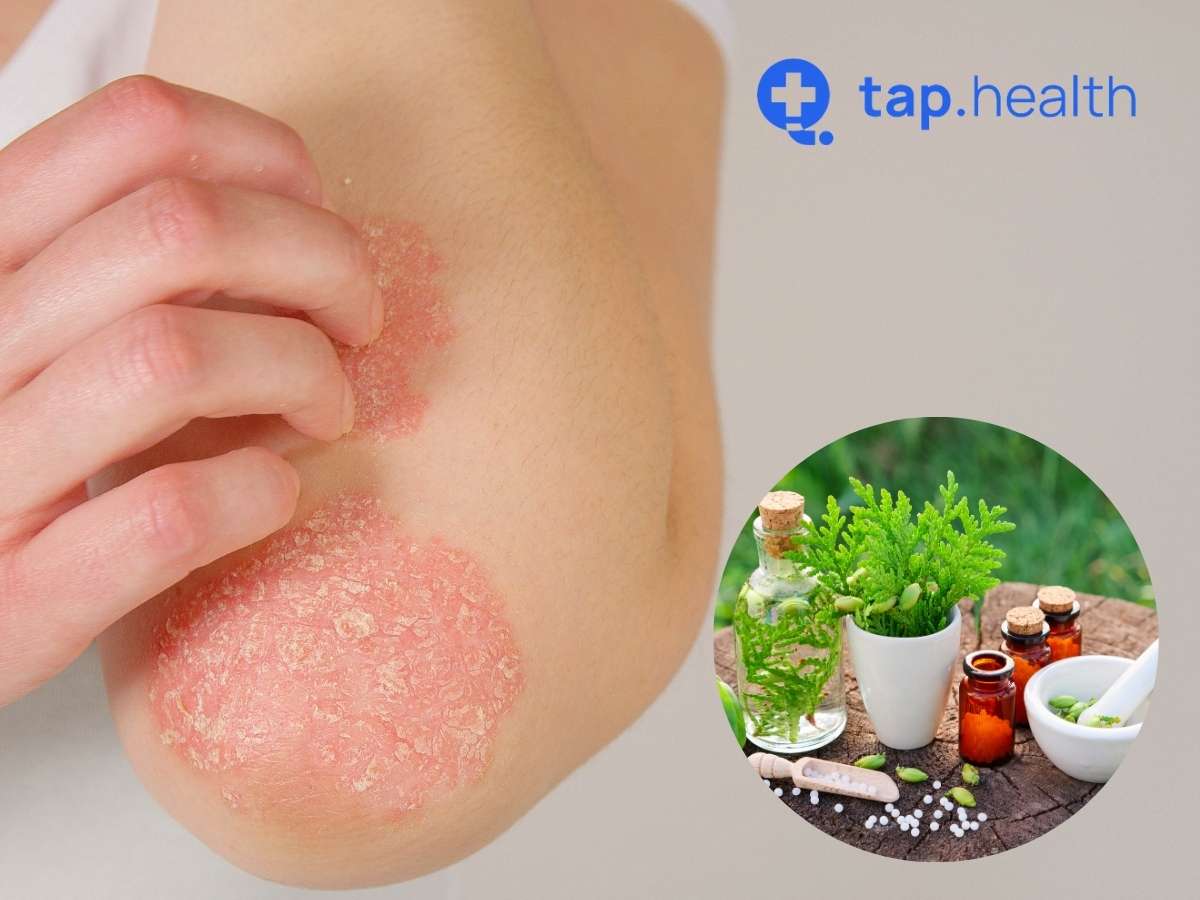Eczema, or atopic dermatitis, is a chronic skin condition characterized by inflamed, red, itchy, and often scaly skin. It affects millions worldwide, and understanding its triggers and remedies is essential for managing it effectively. In this guide, we will explore natural remedies for eczema using homeopathy, detailing how homeopathy works, common symptoms of eczema, various homeopathic remedies, lifestyle changes, diet tips, and frequently asked questions.
How Homeopathy Works for Eczema
Homeopathy is a natural form of medicine that uses highly diluted substances to stimulate the body’s self-healing mechanisms. Developed in the late 18th century by Samuel Hahnemann, homeopathy is based on two main principles: “like cures like” and the “law of minimum dose.”
Like Cures Like: This principle suggests that a substance causing symptoms in a healthy person can, when used in minute amounts, treat similar symptoms in a sick person.
Law of Minimum Dose: This principle emphasizes using the smallest possible dose to elicit a healing response, reducing the risk of side effects.
Homeopathic remedies are prepared through a process called potentization, which involves serial dilution and succussion (vigorous shaking). This process is believed to enhance the healing properties of the original substance while minimizing toxicity.
Homeopathy focuses on treating the individual as a whole, considering physical, emotional, and psychological aspects. Unlike traditional medicine, which often targets specific symptoms, homeopathy aims to address the underlying causes and restore balance to the body. This holistic approach is particularly beneficial for chronic conditions like eczema, where multiple factors contribute to the disease.
Symptoms of Eczema Skin Problem
Eczema presents a range of symptoms that can vary in severity and location. Common symptoms include:
Redness and Inflammation: Affected areas appear red, swollen, and inflamed.
Itching: Intense itching is a hallmark of eczema, often leading to scratching and further irritation.
Dryness and Scaling: The skin may become dry, rough, and scaly, sometimes cracking.
Blisters and Oozing: Small blisters may sometimes form and ooze fluid, leading to crusting.
Thickened Skin: Chronic eczema can cause the skin to thicken and develop a leathery texture.
Discoloration: Affected areas may become darker or lighter than the surrounding skin.
Understanding these symptoms helps identify the appropriate homeopathic remedy and manage the condition effectively.
Can Homeopathy Help Treat Eczema?
Many individuals find relief from eczema symptoms through homeopathy, though the effectiveness can vary from person to person. Homeopathy treats the individual as a whole, considering specific symptoms and overall health. For eczema, remedies are chosen based on detailed case studies, including:
- Type and location of eczema
- Patient’s temperament
- Emotional state
- Personal and family medical history
The goal is to reduce the frequency and severity of eczema flare-ups and improve the patient’s quality of life.
Also Read: Ayurvedic Treatment For Eczema: 8 Effective Remedies
15 Homeopathic Remedies for Eczema
Homeopathy offers a variety of remedies tailored to individual symptoms and underlying causes of eczema. Here are 15 effective homeopathic remedies for eczema:
1. Graphites
Benefits: Suitable for dry, rough, and thickened skin with honey-like discharge.
Usage: Take Graphites 30C once or twice daily.
Effectiveness: Hydrates skin and reduces inflammation.
Side Effects: Mild nausea; consult a practitioner if persistent.
2. Sulphur
Benefits: For intensely itchy, burning skin, worsened by washing.
Usage: Sulphur 30C once daily.
Effectiveness: Reduces redness, itching, and irritation.
Side Effects: Possible initial symptom aggravation.
3. Rhus Toxicodendron
Benefits: Blister-like eruptions worsened by cold, improved by warmth.
Usage: Rhus Tox 30C one to three times a day.
Effectiveness: Reduces itching, heals blisters, and rashes.
Side Effects: Occasional skin rash; discontinue if it occurs.
4. Mezereum
Benefits: Thick crusts and intense itching, spreading from scratching.
Usage: Mezereum 30C once daily.
Effectiveness: Relieves itchiness, promotes healing of cracked skin.
Side Effects: Rare, but may include gastrointestinal upset.
5. Calcarea Carbonica
Benefits: For eczema in individuals with a tendency to sweat excessively, especially on the scalp.
Usage: Calcarea Carb 30C once daily.
Effectiveness: Helps reduce sweating and soothes irritated skin.
Side Effects: None reported when used as directed.
6. Arsenicum Album
Benefits: Suitable for dry, scaly, and itchy skin with burning sensations.
Usage: Arsenicum Album 30C once daily.
Effectiveness: Alleviates dryness, reduces itching and burning.
Side Effects: None reported when used as directed.
7. Petroleum
Benefits: For eczema with deep cracks in the skin, especially on the hands and feet.
Usage: Petroleum 30C once daily.
Effectiveness: Promotes healing of cracked skin and provides relief from itching.
Side Effects: None reported when used as directed.
8. Natrum Muriaticum
Benefits: Suitable for eczema with dry, chapped skin, often worsened by sun exposure.
Usage: Natrum Mur 30C once daily.
Effectiveness: Hydrates and soothes dry, irritated skin.
Side Effects: None reported when used as directed.
9. Sepia
Benefits: For eczema in individuals with hormonal imbalances, often worsened before menstruation.
Usage: Sepia 30C once daily.
Effectiveness: Balances hormones and reduces eczema symptoms.
Side Effects: None reported when used as directed.
10. Psorinum
Benefits: For chronic, stubborn cases of eczema with intense itching and foul-smelling discharge.
Usage: Psorinum 30C once or twice weekly, as directed by a homeopath.
Effectiveness: Provides relief from severe itching and promotes healing.
Side Effects: None reported when used as directed.
11. Hepar Sulphuris Calcareum
Benefits: Suitable for eczema with pustules and sensitivity to cold.
Usage: Hepar Sulph 30C once daily.
Effectiveness: Reduces inflammation and promotes healing of pustules.
Side Effects: None reported when used as directed.
12. Silicea
Benefits: For eczema with a tendency to develop abscesses and boils.
Usage: Silicea 30C once daily.
Effectiveness: Promotes healing of abscesses and soothes irritated skin.
Side Effects: None reported when used as directed.
13. Lycopodium
Benefits: Suitable for eczema in individuals with digestive issues and liver problems.
Usage: Lycopodium 30C once daily.
Effectiveness: Supports liver function and reduces eczema symptoms.
Side Effects: None reported when used as directed.
14. Pulsatilla
Benefits: For eczema with changeable symptoms, often worsened by heat and better in fresh air.
Usage: Pulsatilla 30C once daily.
Effectiveness: Provides relief from itching and soothes irritated skin.
Side Effects: None reported when used as directed.
15. Antimonium Crudum
Benefits: Suitable for eczema with thick, crusty eruptions, often aggravated by cold water.
Usage: Antimonium Crudum 30C once daily.
Effectiveness: Reduces crusting and promotes healing.
Side Effects: None reported when used as directed.
Side Effects of Homeopathic Remedies for Eczema
Homeopathic remedies are generally considered safe, as they are highly diluted. However, potential side effects can include:
- Initial Aggravation: Symptoms may temporarily worsen before improving, known as a “healing crisis.”
- Allergic Reactions: Rarely, individuals may react to certain substances used in homeopathic remedies.
- Interactions: Some remedies might interact with conventional medications, so it’s crucial to inform your healthcare provider about all treatments you are using.
Lifestyle Changes and Diet for Eczema
While homeopathic remedies can significantly improve eczema symptoms, incorporating lifestyle changes and dietary adjustments can further enhance the effectiveness of treatment. Here are some practical tips:
Practical Tips
Moisturize Regularly: Use natural, fragrance-free moisturizers to keep the skin hydrated. Apply immediately after bathing to lock in moisture.
Avoid Triggers: Identify and avoid allergens or irritants that exacerbate eczema. Common triggers include certain fabrics, soaps, detergents, and environmental allergens.
Gentle Skincare: Use mild, hypoallergenic soaps and detergents. Avoid hot showers and harsh scrubbing, which can strip the skin of natural oils.
Stress Management: Practice relaxation techniques like yoga, meditation, or deep breathing exercises to reduce stress levels, as stress can trigger eczema flare-ups.
Diet and Nutrition
Omega-3 Fatty Acids: Found in fish oil, flaxseeds, and walnuts, omega-3 fatty acids help reduce inflammation and support skin health.
Probiotics: Consuming yogurt, kefir, and other fermented foods can improve gut health and boost immunity, potentially reducing eczema symptoms.
Antioxidant-rich Foods: Berries, leafy greens, nuts, and seeds are rich in antioxidants, which help protect skin cells from damage and promote healing.
Hydration: Drink plenty of water throughout the day to maintain skin hydration and overall health.
Elimination Diet: Consider identifying food allergies or intolerances by eliminating and reintroducing common allergens like dairy, gluten, or soy. Working with a nutritionist can help create a personalized diet plan.
How Long Does Homeopathy Take to Cure Eczema?
Eczema is a chronic skin condition causing itchy, inflamed, and often painful patches on the skin. Many people turn to homeopathy for a natural and holistic treatment. But, a common question arises: how long does homeopathy take to cure eczema?
Factors Affecting Treatment Duration:
- Severity and Duration of Eczema:
- Mild cases may see improvement in a few weeks.
- Chronic or severe cases can take several months.
- Individual Health and Response:
- Overall health and how well a person responds to the remedy can influence healing time.
- Adherence to Treatment Plan:
- Consistent follow-up sessions and remedy adjustments are crucial for effective treatment.
FAQ on Homeopathic Remedies for Eczema
1: Is homeopathy safe for children with eczema?
Yes, homeopathy is generally safe for children. However, it’s important to consult a qualified homeopath to determine the appropriate remedy and dosage for a child’s specific symptoms.
2: Can I use homeopathic remedies alongside conventional treatments?
Yes, homeopathic remedies can often be used alongside conventional treatments. However, it is crucial to inform both your homeopath and your primary healthcare provider about all the treatments you are using to avoid possible interactions and ensure a coordinated approach.
3: How long does it take for homeopathic remedies to show results in eczema treatment?
The timeframe for results can vary depending on the individual and the severity of the eczema. Some people may notice improvements within a few days to weeks, while others might take several months. Consistency in following the prescribed remedies and lifestyle changes is key to achieving the best outcomes.
4: Are there any side effects associated with homeopathic remedies for eczema?
Homeopathic remedies are generally considered safe and have minimal risk of side effects due to the high dilution of active ingredients. However, some people may experience a temporary worsening of symptoms, known as a “healing crisis,” which typically resolves on its own. If you experience any adverse effects, consult your homeopath.
5: Can diet alone cure eczema?
While diet plays a significant role in managing eczema, it is usually not sufficient to cure the condition on its own. A comprehensive approach that includes dietary changes, homeopathic remedies, and lifestyle modifications offers the best chance for long-term relief and skin health.
6: What should I avoid if I have eczema?
If you have eczema, it’s important to avoid triggers that can worsen your symptoms. Common triggers include:
Harsh soaps and detergents
Synthetic fabrics like polyester and wool
Extreme temperatures and humidity
Stress
Certain foods that may cause allergic reactions
7: How do I find a qualified homeopath?
To find a qualified homeopath, consider recommendations from trusted sources such as friends, family, or healthcare providers. Additionally, you can search for practitioners through professional organizations like the National Center for Homeopathy (NCH) or the American Institute of Homeopathy (AIH), which maintain directories of certified practitioners.
8: Can homeopathy prevent eczema flare-ups?
Homeopathy aims to address the underlying causes of eczema and strengthen the body’s immune response. While it may help reduce the frequency and severity of flare-ups, it is essential to follow a holistic approach, including avoiding known triggers, maintaining a healthy lifestyle, and practicing good skincare.
9: Are there specific homeopathic remedies for different types of eczema?
Yes, homeopathic remedies are tailored to the individual’s unique symptoms and the type of eczema they have. For example, Graphites is beneficial for dry, rough skin, while Rhus Toxicodendron is effective for blister-like eruptions. A qualified homeopath can help determine the most appropriate remedy based on your specific case.
10: Is it safe to self-prescribe homeopathic remedies for eczema?
While many homeopathic remedies are available over-the-counter, it is recommended to consult a qualified homeopath for accurate diagnosis and personalized treatment. Self-prescribing without proper knowledge may lead to ineffective treatment or aggravation of symptoms.



